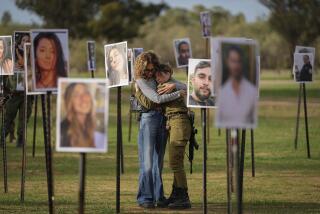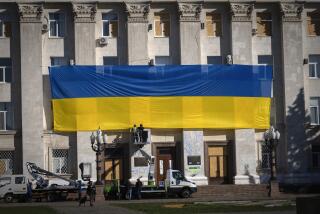Amid Joy in Kosovo, Fear and Danger Abound
- Share via
PRISTINA, Yugoslavia — On a euphoric day of liberation from Serbian authorities, ethnic Albanians mingled freely in the streets of Kosovo’s capital Monday, but in a sign of challenges ahead, peacekeepers arrested suspected ethnic Albanian arsonists and suffered their first two deaths clearing unexploded ordnance.
Pristina’s ethnic Albanian majority reveled in rights denied it for years--such as starting the presses of a newspaper banned in 1991. But mostly, as editor Kamber Avdiv put it, they just enjoyed “being able to breathe freely.”
Alliance military authorities said two soldiers, members of the British contingent’s Nepalese Gurkha force, were killed in an explosion at a school 20 miles outside the provincial capital, where the peace force was clearing mines, booby traps and unexploded ordnance. Two civilians died as well.
It was the latest sign of the myriad dangers that remained a day after the last Serbian forces left.
In another incident, French marines deploying in a mile-long convoy to the north of the capital held seven ethnic Albanians at gunpoint--arrested after the troops watched for two days as they burned Serbian houses. The widespread arson appears to be in retaliation for a campaign of looting and killing by Serbian forces that drove more than 1 million ethnic Albanians from their homes while NATO bombs fell throughout Kosovo and the rest of Serbia.
As thin columns of smoke rose from hillsides, Kosovo Serbs continued to flee ethnic Albanian neighborhoods. In some towns, this migration is creating new ethnic enclaves.
From other towns in this province, which was 90% ethnic Albanian before the war, Serbs continued heading north to other areas of Serbia, adding to a refugee surge of 50,000 since NATO’s air war ceased.
Villages north of Pristina erupted in emotion as the first of the 800 ethnic Albanian prisoners who were mysteriously deposited near the Albanian border 15 days ago after five weeks’ imprisonment finally came home--among the latest in a refugee return that now totals 140,000.
Fetah Istrefi cried as he hugged his 4-year-old son, Dionis, after an overloaded truck hired to bring the first wave of the former prisoners from Albania arrived at the village of Velika Reka north of Pristina.
“Did they torture you?” a woman asked one of the men, who were rounded up and jailed in the northern city of Kosovska Mitrovica along with what they said were 10,000 other ethnic Albanians.
“Don’t ask,” he replied, as his family wept with joy.
The released prisoners then poured into a makeshift refugee housing area across the road--a modern settlement for Serbs who fled earlier conflicts in Bosnia-Herzegovina and Croatia that its former residents said was seized from them by the Kosovo Liberation Army guerrilla force last week.
As the peace force strengthened its grip on Kosovo, Secretary of Defense William S. Cohen announced plans at the Pentagon to return about 300 of the more than 700 U.S. aircraft used in the bombing campaign to home bases in Europe and the United States.
Cohen said he will “very shortly” consider lifting an order that prevented thousands of Air Force personnel from retiring. This “stop-loss” order has applied to pilots, ground crews and other personnel who might be needed in the campaign.
Early Monday, the KLA unilaterally agreed to renounce the use of force and refrain from “all hostile or provocative acts.”
Explaining a six-page document he signed after several days of negotiation with NATO, in which the KLA vowed to demilitarize, rebel leader Hashim Thaci told reporters that it was “part of a political process designed to determine Kosovo’s future.”
In the document, which peacekeeping force commander Lt. Gen. Mike Jackson stressed was an “undertaking, not an agreement,” the KLA also stated its intention to transform itself into a force similar to the U.S. National Guard.
The KLA pledged to turn in its heavy weapons to storage sites manned by the rebels and peacekeeping forces within a month, and travel unarmed on main roads. The process of negotiating the deal produced a seemingly odd appeal by Thaci on Monday.
Thaci, who fought with the nom de guerre “Snake,” called the Serbian exodus from Kosovo “a phenomenon that is upsetting us.”
“We ask all Serbs who have escaped recently and committed no crimes to come back to a democratic Kosovo,” said Thaci, whose group continued to fight for a separate Kosovo state throughout the NATO bombing.
Despite the chaos in the countryside and the confused politics behind creating a new government in the capital, there were joyful reunions everywhere Monday, as refugees saw friends and neighbors after months of fearing the worst.
Pristina, which greeted the first peacekeepers with looting, a reputed torture chamber, skeletons and charred and bombed-out housing blocks, had a surprising air of normalcy Monday.
Children rode bikes around half a dozen rusted shells of burned-out cars. Men pushed battered and gas-drained cars to the few functioning filling stations.
Many emerged for the first time from basements they rarely left since NATO began its bombing campaign March 24. But for most of them, Monday brought a liberation from several years that had kept them indoors much of the time.
It was routine for Serbian police repeatedly to stop and demand identification when ethnic Albanians drove from their jobs to their homes. Most tried to keep a low profile.
“Before, you were not safe to open your front door,” said Avdiv, the editor.
“They looked for your ID, they beat you or arrested you outside your door, and now that fear is gone. . . . We are convinced a new life is being born--a life of freedom that is more valid than anything else.”
Avdiv’s newspaper, Rilindja, was banned in 1991. In February, it restarted its presses, but it was stopped by the government on March 22--two days before NATO’s bombing began.
On Monday, Serbs bought from ethnic Albanian vendors, and Albanian children bought popcorn from the Serbian vendor who has been doing business on the same corner for 24 years.
Markets hummed with life as vendors exchanged money, trucked in fresh produce and oil and did brisk business selling L&M; and Marlboro cigarettes, along with the Albanian brand, American Legend.
Albanians patronized Serbs and Serbs patronized Albanians. Qamil Vrajolli, 58, an Albanian buying vegetables from Serb Budimir Milenkovic, said: “We feel free at last, and we have to thank God and America. We don’t have anything against the Serbs. We were just afraid of the soldiers and police.”
Asked if he feared being a minority among a scarred majority, Milenkovic replied: “Why should I be afraid? I was born here. I had a good life here. I just know I help my neighbors with food and water.”
Elatica Nedeljkovic, a Serbian shopkeeper with orange nail polish and bleached blond hair, interrupted: “We are the last to blame. . . . If we felt guilty, we would have left” along with the other Serbs who have fled.
Asked her feelings about the urban landscape of looted and charred ethnic Albanian homes and shops, Nedeljkovic said: “I cannot describe how awful it is. We’re ashamed to be Serbian. If we were asked, nobody would have approved this.”
And why did they not speak out against it? “We’d be afraid the same thing would happen to us,” she said.
*
Times staff writer Paul Richter in Washington contributed to this report.
More to Read
Sign up for Essential California
The most important California stories and recommendations in your inbox every morning.
You may occasionally receive promotional content from the Los Angeles Times.













